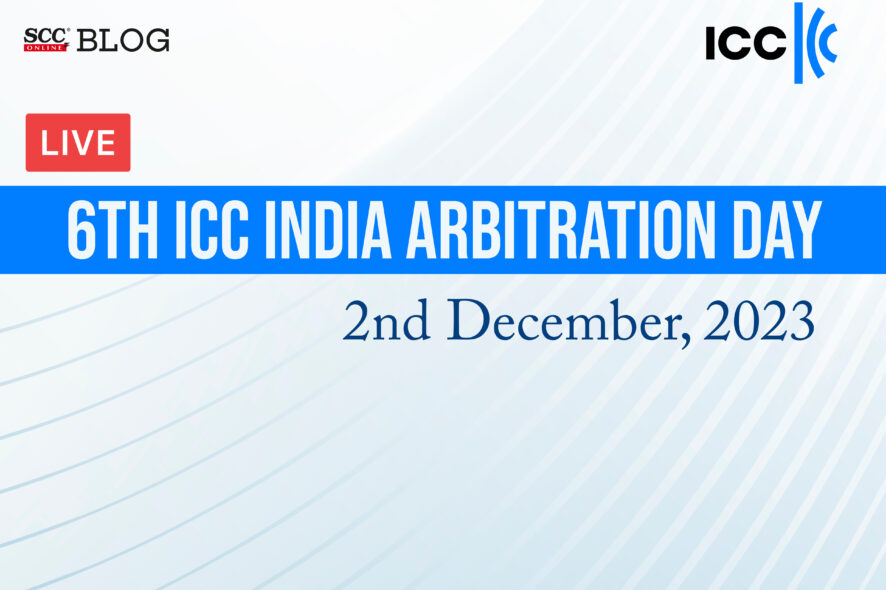The International Chamber of Commerce is organizing 6th ICC India Arbitration Day on 2-12-2023 while celebrating the Centenary of the ICC International Court of Arbitration (ICC Court).
“During the Centenary of the ICC International Court of Arbitration, I am thrilled to be back in Delhi and connect with so many of the Indian parties and counsel who trust ICC for their dispute resolution and prevention needs.”
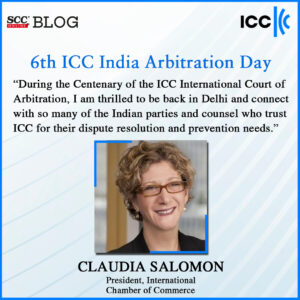
Claudia Salomon
President, International Chamber of Commerce
“Concluding our centenary year, in India with the Hon’ble Vice President of India addressing our annual conference – such an honour!”
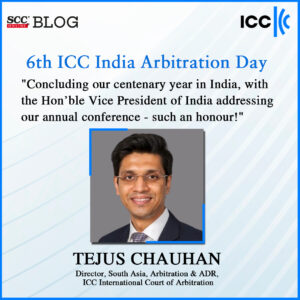
Tejus Chauhan
Director, South Asia, Arbitration & ADR, ICC International Court of Arbitration
“Celebrating 100 years of the ICC Court in India with court members (alumni and current) and the arbitration bar that have been a part of this legacy is undoubtedly a special milestone.”
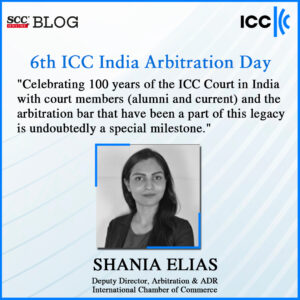
Shania Elias
Deputy Director, Arbitration & ADR
International Chamber of Commerce
“It is a perfect timing for the ICC International Court of Arbitration to increase their focus on India and organise the India Arbitration Day as part of their Centenary celebrations. India will be a very important market for Arbitration and ADR in this century. With the support from all stake holders including the government’s vision to make India an arbitration hub, renowned institutions such as the ICC will certainly play an important role in bringing this effort to fruition.”
Ganesh Chandru
Partner, Dua Associates
December 01, 2023
Mr. Kunal Vajani, Joint Managing Partner at Fox & Mandal organized a dinner on 1-12-2023 in the honour of Justice Dato’ Mary Lim Thiam Suan, Judge, Federal Court of Malaysia, Claudia Salomon, President, ICC International Court of Arbitration, Paris, Alexander G. Fessas, Secretary General, ICC International Court of Arbitration, Paris with other guests, moderators and panelists, in the presence of guests of honor, Justice B.N. Srikrishna, Former Judge of the Supreme Court of India, and R. Venkataramani, Attorney General for India.
December 02, 2023
Inaugural Session
In the opening address by Mr Alexander G. Fessas, Secretary General, ICC International Court of Arbitration, Paris, he stressed about ICC uniting everyone to ensure access to justice, stating that it has been the founding mission to serve since 1953. While addressing the Vice President of India, Shri Jagdeep Dhankhar, he recalled that “When Claudia and I met him for the very first time, his excellency was very quick to remind us of him having been at the ICC Court for India.”
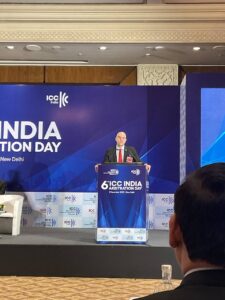
In a special address by Ms Claudia Salomon, President, ICC International Court of Arbitration, Paris, she said that “This is a special occassion because we are celebrating the centenary of ICC Court. We launched the centenary with a declaration of a future for dispute resolution. For 100 years, we have focused on what we are currently doing, but on future too. It represents our global community and reach, training, education, represents diversity, our core mission, the shared core mission to ensure access to justice and the rule of law.”
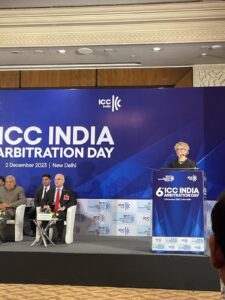
Ms Claudia caught everyone with the words ‘The future is now and the future is India’. Speaking of the ICC’s arbitral process, she explained that they follow a mechanism that’s independent and impartial, a mechanism that is efficient and the parties know the quality of service that ICC provides.
The Vice President of India, Shri Jagdeep Dhankhar addressed the audience and began with his association with the ICC Court and ICC Commission on Arbitration and ADR. He went on to laud the Indian economy that “We are in our Amritkal. India is witnessing as a 3rd largest global economy. Celebration of ICC centenary is a glorifying moment. India’s economy is rising as never before, which brings a fair opportunity for investment, and things are bound to face disputes.”
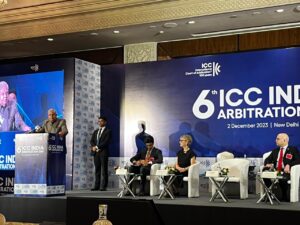
Speaking of the ICC as an institution and celebrating the centenary, he said that “I recall my days at the ICC and it was learning experience everytime. The journey of the institution has been great. This event is a powerful testament for the growing arbitration in India. It’s a very expert subject, and ICC’s contribution is pivotal” He also praised the Chief Justice of India for his attempts to cleanse the system, who also happened to have commented that the retired judges dominate the filed of arbitration. He added that “What CJI reflected, one way, would be to have arbitral institutions. This will cleanse the system of something we don’t regard very wholesome.” Vice President opined that ‘We are living in very tough times. Even before the technological invasion has taken place in full bloom, we are alarmed, we are worried. Disruptive technologies, will like you to know, are a part of our life. We are their bedfellows. We have to continue to live with them and disruptive technologies bring in their wake, disputes that would require instant resolutions. Time has come when we need to introspect and move forward towards necessary changes in the field.’
Coming back to speaking of arbitration, he further opined that Institutional arbitration as against the ad hoc arbitration has much more importance, and that ICC as a brand stood the test of time. He commented upon the struggles and expressed that “Judicial interference has reduced arbitration. You have an award and there’s a challenge, a statury appeals come in…. We have to evolve a mechanism so that judicial intervention does not affect arbitration.” He batted that access to judicial system is a fundamental right, and that disruptive technologies bring disputes which require instant resolutions. He enthusiastically expressed that “Now, we have to be faster than the fastest”
Before concluding his remarks, the Vice President highlighted the topic of discussion “Recent trends in Indian Arbitration – Leaning towards Harmony or Disorder?” and requested that “Your sesson 1 is very critical to the economy of this country. Delve deeper into it. The diagnosis has to be like an MRI and not an X-Ray.”
Session 1
Recent trends in Indian Arbitration – Leaning towards Harmony or Disorder?
The push for reform in the Indian arbitration regime is echoed right from the legislature to legal representatives. The panel examined and shared insights on topical issues including stamping of arbitration agreements, third party funding, technology and arbitration, joinder of non-signatories, and entry of foreign law firms, followed by a discussion on how the emerging viewpoints on these issues may shape the arbitration practice, domestically and internationally.
Mr Rohit Bhat, Lead India Disputes, Freshfields Bruckhaus Deringer, Singapore, while moderating the discussion, hinted towards some recent, important developments and began with first issue being stamping of arbitral agreements.
Mr Amar Gupta, Partner, JSA Advocates & Solictors, New Delhi pointed fingers towards the decision of the Supreme Court in NN Global case which had the last words. According to him, it was choosing a step back on what the Indian Courts had decided earlier. He added that the reasoning on stamp duty was critic and unfriendly decision for arbitration, though statutorily supported. He was hopeful that the Supreme Court will reinstate well established principle of arbitration agreement being an independent agreement without being tinted with requirements like that of stamping.
Mr Vijayendra Pratap Singh, Senior Partner, AZB & Partners, New Delhi also targeted the Supreme Court’s decision in NN Global, since the matter decided by the 5-Judge-Bench got into the hands of a 7-Judge-Bench within a matter of months. He expressed that the Courts are very clear that everything goes down the lane to the arbitral tribunal goes away from the Court.
On this, Mr. Amar Gupta countered that the Courts were playing their part making things workable. He further hinted towards the Bombay High Court’s decision on deciding stamp duty of arbitration agreement.
As Mr. Rohit brought in the context of Emergency arbitration and enforcement of arbitration awards in India, its position as it stands currently, Mr Dinesh Pardasani, Partner, DSK Legal illuminated that India doesn’t have stronger laws supporting emergency arbitration award, but decisions like in Amazon case, Courts have helped. Even international arbitrations seated outside India can be enforced in India, but some clarity is required in that aspect. Mr. Vijayendra commented that “Our Arbitration Act is a tale of two cities. We seek foreign parties to come to India, invest here, and settle disputes in India. For foreign awards, we welcome them, but Courts need to be more accepting. India seated award seems more like an ATM machine regarding the access. I’m hoping that we will come to have a single law irrespective of where you come from, being loved as one.”
Explaining the concept of Group of Companies Doctrine and its position in the current scenario, Ms Madhavi Divan, Senior Advocate, Supreme Court of India said that “When you have a group of entities constituting a single economic entities, regardless of being signatories are subjected to arbitration agreement, that’s what the Group of Companies Doctrine is.” She further pnamed judgments like MTNL which provide that you can escape the consent part for cultural connection with economic entities, a matter which was referred to the larger bench for clarity.
Bringing in discussion on legal glitches around Third Party Funding in arbitration, Mr Dinesh expressed that “We are waiting and the wait will be a little longer. Just like the 2023 Men’s Cricket World Cup, we did everything right till the finals, we still lost. For arbitration, we are doing everything right until it comes to enforcement of third party funding. Investors want to come to India, they want to invest, but enforcement of awards requires some more efforts to win the World Cup.”
Mr. Rohit pointed towards a case when the High Court’s Single Bench upheld an arbitral award, the Division Bench set it aside, and the Supreme Court restored it – It took 6 years. He went on to ask “How do you see the procedural gaps can be dealt with?” Ms. Madhavi started with the example of a 1991 agreement wherein, Award was given in 2013 and the Court’s Judgment got reserved somewhere in May 2023. This made her to comment that “This is the state of affairs, and unless we have a seamless system where we tackle resolution from start to finish, we need seamless passage through the courts or things are going to be stuck forever.” She further pointed towards the recent trend of fragmentation of arbitral disputes arising from the same agreement being referred to different tribunals tagged it as an abuse of process. She added that “Parties try to test the waters for in whose favour the arbitrators decide” and cautioned that this problem needs to be fixed.
When years of judicial delay was mentioned, Mr. Amar praised the timelines that the Delhi HC followed, and stated it to be comparable to what the world follows. He also added that “Different High Courts have different ways of doing their business and some of them are much faster.”
Mr. Vijayendra caught the attention with his knowledgeable words “Every saint has a past and every sinner has a future.” with the hope that we may see more commercial courts. We do not have the same no. of courts available to ensure that the pipeline that’s coming in clears quickly. He added that “Courts are getting a sense of arbitrability in the process. Parties need to be sure, to understand whether you want to arbitrate. If you are already in court, start getting into a consolidated process. Take your choice of poison and if you have already chosen, live by it because the antedote is going to be another poison will only work on a particular poison”
Mr. Dinesh commented that “Enforcement is an issue in India mainly because of the mindset. We need a radical change.”
Ms. Madhavi lauded the High Court Judges for being overworked and still doing an amazing job. According to her, individual judges cannot bear this burden of arbitration aspects.
Mr. Amar targeted that “Commercial Courts have not lived up to the expectations. The quality, competence and capacity has been indifferent. Capacity building is of utmost importance. There are two streams: One, there are judgments which stretch the law, and there’s another where the Judge sticks to the textual version and makes the conclusion which suits his idea of justice.” He further commented that choosing a seat outside India for 2 Indian parties seems to be a good, arbitration friendly idea. But Courts have not shown much support in that aspect.
Session 2
The balancing act in infrastructure and construction projects: building synergy between companies, legal representatives and experts
With India projected to become the third largest construction market globally by 2025, the construction and infrastructure sector is a vital industry for growth and investment. Navigating the complexity of construction and infrastructure arbitrations brings with it the complexity of bulky pleadings, hyper technical evidence, and quantum considerations.
Mr Reza Mohtashami KC, Partner, Three Crowns, London began with comments on the nature of disputes that “Claims in infrastructure and construction disputes can be very different. The usual suspects may be delay in claims. Another aspect can be whether a finished project maintains specifications. Breach is easier to assess but damages are harder for calculating the economic loss.”
Ms Gitanjali Bajaj, Partner and Co-Head for International Arbitration, APAC, DLA Piper, Australia agreed with Mr. Reza and expressed that “Each dispute is unique to the stakeholders, but the basic trends we see are poorly drafted contract, poor risk calculation and poor contract management/administration.”
Speaking of challenges in construction contracts, Mr. Reza raised concern over effective contractual protections from economic sanctions. With focus on dealing with disputes arising out of Construction and Infrastructure Contracts, he added that “It’s more like a boxing game where you fight with your one hand tied behind. The advice I give to public sector clients is educate your clients for keeping records.”
Seeking suggestion for clients stuck with a construction dispute and upon recent mechanism brought by Government of India to resolve disputes, Mr Kabir Singh, Partner, Clifford Chance; ICC Court Member (Singapore), the moderator, passed the ball in the Court of Mr Shashank Garg, Counsel, High Court of Delhi and Supreme Court of India, who in turn suggested for clients to try and not get stuck. He shared his stance that “There’s certainly no case where I found a malafide intent on the state entities. Identify red flags in time and try to resolve them.” He also suggested everyone to choose the arbitrator very carefully, explaining that parties need somebody who understands the subject matter and has a hold on it.
Sharing about the challenges, Mr. Shashank added that “There’s a problem that the State entities first go on with filing the claims and engage the lawyers later. Justifying the claims becomes a tough task for the lawyers.” With the mention of the recent ‘Vivaad se Vishwas’ scheme, he praised that “There’s an understanding of the problem and steps are being taken by the government.”
Mr Gaganpreet Puri, Managing Director, Risk & Regulatory Leader, Alvarez & Marsal, New Delhi stated that another significant aspect for the government contracts is their older documentation. He explained that “You got contradictory facts and claims and trying to figure out the story based on five different pillars. I always budget more time for Govt. Contracts to bring everyone on the same page.”
Mr. Kabir again pointed towards Mr. Shashank to discuss dealing with a dispute that arose in furtherance of a construction agreement, he expressed that “There’s a fear of technology when it comes to State entities. They’re either dismissed outrightly, or there’s a reluctance in their approach, and this factor requires immediate attention.” Speaking of challenges in dispute resolution in construction disputes, he also cleared the clouds that “We like judge bashing for former judges doing arbitration, but the way the number of disputes are increasing, there’s an immediate need for more and more trained arbitrators and specialised courts. We have to deal with expert arbitrators dealing with a dump of evidence dumped by state entities, which becomes troublesome. There are statutes in India that override any existing contracts.”
Session 3
Where should the line(s) be drawn in implementing the policy of minimal curial intervention in international arbitrations?
In the first half of 2023, the Delhi High Court invited comments from stakeholders on the scope of modification and partial setting aside of awards.
The Speakers will begin by considering the judicial limits placed on the purview of arbitral tribunals to eliminate the grounds for setting aside the arbitral award when an award is remitted back, and then examine the interplay between the doctrine of severability versus the power of courts to partially set aside awards.
The discussion will also bring out international perspectives on the grounds for challenging awards and take into consideration approaches from leading hubs of international arbitration, while attempting to answer whether a non-interventionist approach promotes growth of arbitration and rule of law.
· Hon’ble Justice Hrishikesh Roy, Judge, Supreme Court of India
· Hon’ble Justice Dato’ Mary Lim Thiam Suan, Judge, Federal Court of Malaysia
· Hon’ble Justice Navin Chawla, Judge, High Court of Delhi
· Mr R Venkataramani, Senior Advocate, Attorney-General of India
Chair:
· Mr V K Rajah SC, Arbitrator and Mediator, Duxton Hill Chambers; Former Judge of the Court of Appeal of Singapore; Vice President, ICC International Court of Arbitration
Commenting on Supreme Court’s special powers under Article 142, Mr VK Rajah says that it is a challenge to get all stakeholders move together in the same direction.
Justice Roy bats for opting ADR as lakhs of civil matters pending altogether with the SC, HCs and lower courts, and criminal matters are not included here.
Justice Chawla says that the reasons for changing mindset towards arbitration is globalisation. It’s also in the day to day policy.
Arbitration used to be a side practice, but it has taken as a separate field altogether. That has brought about this whole transformation. With the backlog with the Courts, people accept arbitration as the efficacious mode of ADR.
Justice Mary Lim says that Almost 20 years down the line, and the language is not about striking a balance but keeping minimal intervention, boosting the confidence of the industry and arbitral community.
Mr VK Rajah while talking about the role of Courts in India says that Courts play a critical role. The Supreme Court today is generally getting it right, NN Global case is a hiccup. It’s significant that the courts are not waiting for appeals or the legislative improvements, but are taking things on their own. However, the perception is that HCs can be problematic and even follow a step forward and several steps backwards. How to make India a preferred seat for arbitration?
What else can India do, the Courts do, with deep acknowledgement that enormous progress has been made.
Justice Roy focussed on training sessions while quoting an example of a National Judicial Academy in Bhopal running several courses for High Court Judges in India, in which they pick several topics and can have session devoted to arbitration. Indian Law Institute could also take the initiative of a condense program, where the college professors may not have the practical experience.
Justice Chawla while commenting on the role of courts said that ‘We at the Supreme Court assume it as an Appellate Court, an approach which is also refreshed in negative at the NJA, but where to draw that laxman rekha and how not to cross it comes with the experience’.
Justice Mary said that adopting and embracing the philosophy of minimal intervention, it’s unapologetic. It starts with, you now have to convince me why I need to go away, and not into why one side is right and the other is wrong. The presumption that it’s right is the ethos of minimal intervention.
Session 4
Behind the scenes of ICC Court – Mock Session of the ICC International Court of Arbitration on Draft Award Scrutiny
One of the hallmarks of ICC dispute resolution services is the scrutiny of draft awards undertaken by the ICC Secretariat and members of the ICC Court.
Members of the ICC Court will lead an interactive mock plenary session and conference attendees will be able to act as Court members contributing to the scrutiny of a mock draft award. This session will highlight how the ICC Court may approach various issues in draft awards and how this service improves the quality and enforceability of each ICC award.
- Mr Alexander G Fessas, Secretary General, ICC International Court of Arbitration
- Ms Claudia Salomon, President, ICC International Court of Arbitration
- Ms Pallavi Shroff, Managing Partner and National Practice Head of Dispute Resolution, Shardul Amarchand Mangaldas & Co; ICC Court Member (India)
- Mr Kunal Vajani, Joint Managing Partner, Fox & Mandal; ICC Court Member (India)
- Mr Sanjeev Kapoor, Partner, Khaitan & Co; Vice President , ICC International Court of Arbitration
- Ms Smitha Menon, Partner and Head of Restructuring & Insolvency Practice, Wong Partnership LLP; ICC Court Member (Singapore)
- Ms Hazel Tang, Counsel, Secretariat of the International Court of Arbitration Singapore
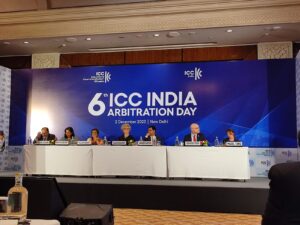
The panel discussed the enforceability of the award may be introduced.
Ms Shania Elias , Deputy Director, ICC Arbitration and ADR, India gave the closing Remarks and Vote of Thanks.



